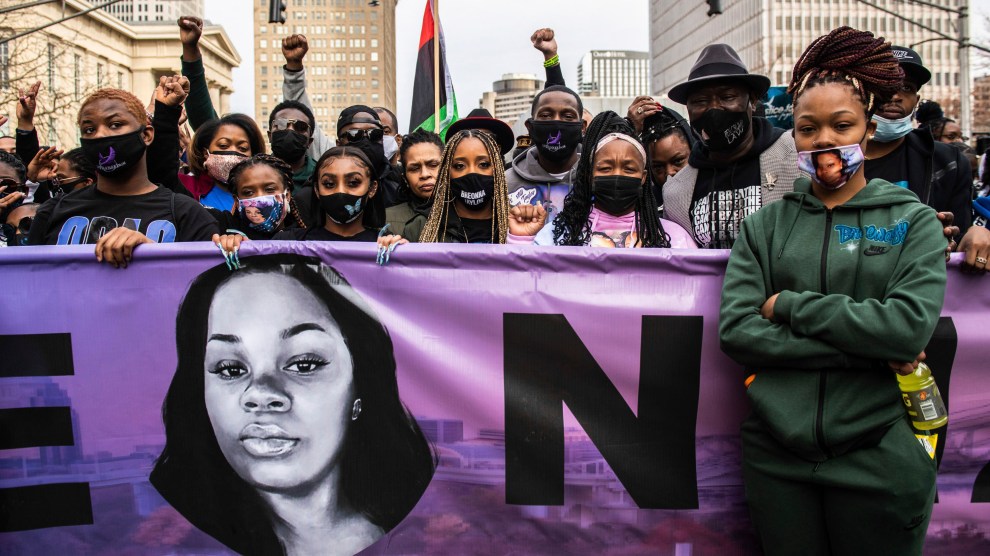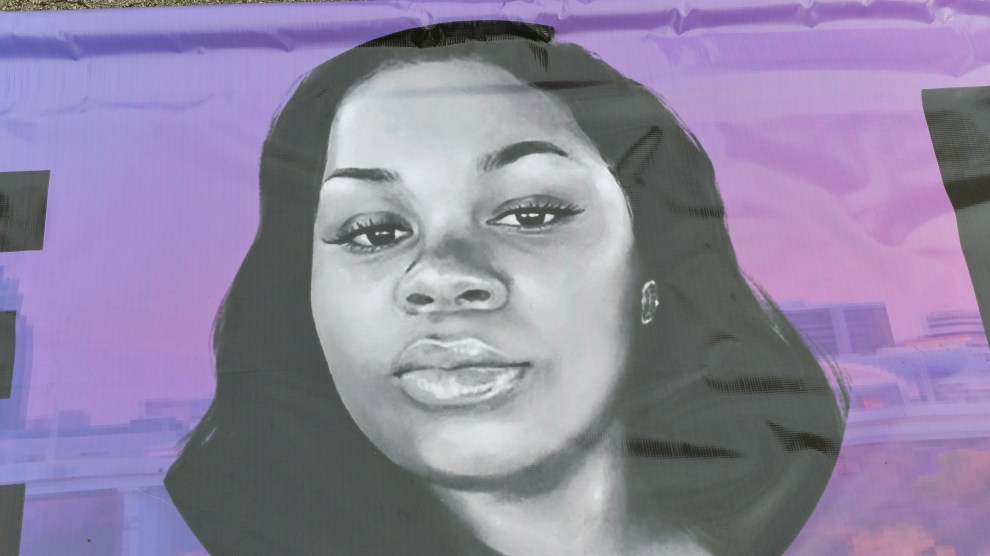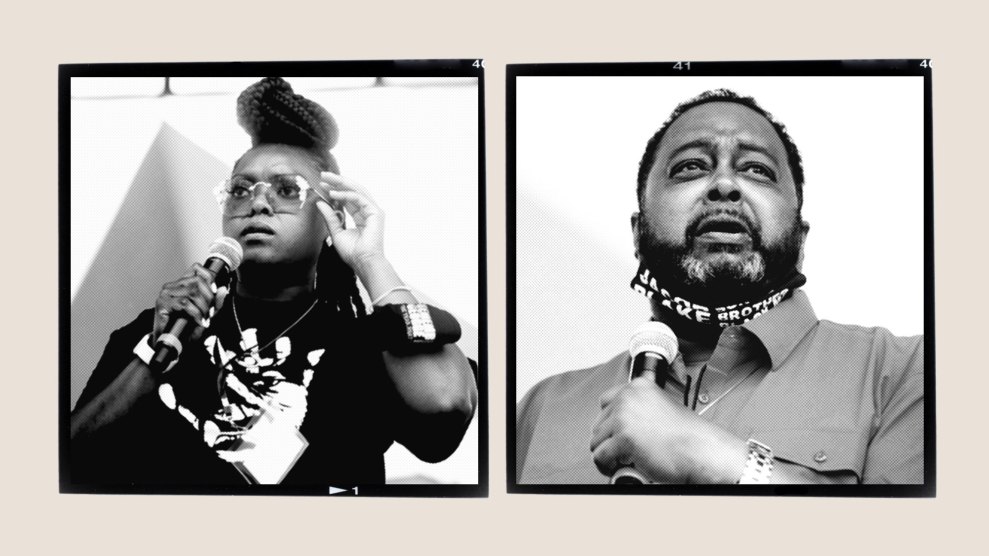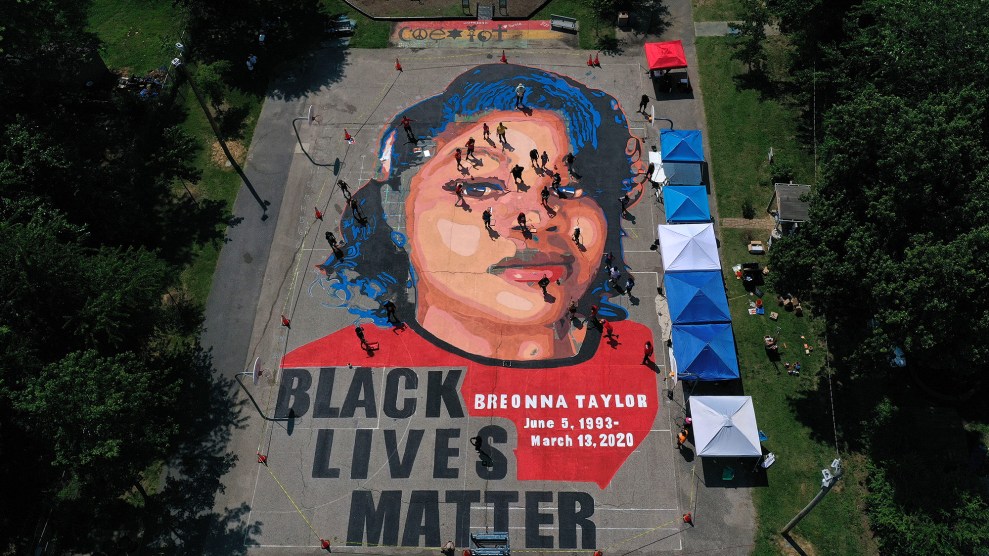
Tamika Palmer, Breonna Taylor's mom, joins protesters on the one-year anniversary of Taylor's death. Chris Tuite/ImageSPACE/MediaPunch/IPX via AP
Myles Cosgrove, the former Louisville, Kentucky, police officer who fired the shot that killed Breonna Taylor in 2020, just got a new job at a nearby sheriff’s office.
The Carroll County Sheriff’s Office confirmed to local reporters on Saturday that it hired Cosgrove after he passed a background check; following investigations by the state attorney general’s office and federal prosecutors, he never faced criminal charges for his role in Taylor’s death. “This is a prime example of how police officers are protected” and “able to get away with such vicious crimes with no accountability,” Taylor’s aunt Bianca Austin told Mother Jones on Sunday. While she and her family continue to mourn for Taylor, she said, the officers “get to move on living their lives.”
Cosgrove was one of three Louisville officers who shot their weapons during the botched drug raid on Taylor’s home in March 2020. Taylor was a 26-year-old emergency room technician and aspiring nurse. She and her boyfriend, Kenneth Walker, were sleeping when seven plainclothes officers broke down her front door with a battering ram. Walker, thinking they were intruders, grabbed a gun and fired a single shot that struck one of them, and the others returned with a barrage of bullets that killed Taylor. Walker called 911 for help, not realizing it was the police who attacked her. The officers did not find drugs on the premises, and the incident led to nationwide protests that grew after a Minneapolis officer killed George Floyd two months later.
The Louisville Metro Police Department fired Cosgrove in January 2021 for failing to “properly identify a target” when he shot 16 times into Taylor’s apartment, and for failing to use his body camera. The department also fired three other officers involved with the raid.
According to an investigation by Kentucky Attorney General Daniel Cameron, it was Cosgrove who shot the bullet that killed Taylor. But Cameron did not charge Cosgrove, saying he was justified in shooting because Taylor’s boyfriend fired a weapon first.
Instead, Cameron charged another officer, Brett Hankison—not for attacking Taylor, but for endangering her neighbors by shooting so recklessly. A jury then acquitted him. Federal prosecutors also charged Hankison with civil rights violations and three other officers for their alleged role falsifying a search warrant for the raid, but they are not prosecuting Cosgrove, who they said was not involved in obtaining the warrant and did not know it contained inaccurate information. (Former officer Kelly Goodlett pleaded guilty, while the other officers’ cases are ongoing.) Last year, Cosgrove sued the police department for firing him, but a judge upheld the termination.
The Carroll County Sheriff’s Office, about an hour northeast of Louisville, cited the lack of criminal charges for Cosgrove as a reason for giving him a new job, along with his two decades of police experience. “We think he will help reduce the flow of drugs in our area and reduce property crimes,” Chief Deputy Rob Miller told the Courier Journal. “We felt like he was a good candidate to help us in our county.” Police accountability activists are planning protests for Monday.
Meanwhile, another officer who shot his weapon during the raid is defending Cosgrove’s right to work in policing again. John Mattingly, who retired from the Louisville police department last year, went on Twitter this weekend to criticize the protesters. “These intolerant crazies want to deprive American citizens, who’ve been cleared, an opportunity at supporting their families,” he wrote. “I’m sick of these social justice warriors, who have no clue what the facts are, spreading lies and misinformation.”
Mattingly wrote a book about the raid and its aftermath. In January, he did a publicity event for it at a restaurant in Kentucky, playing audio of gunshots as diners who had not signed up for the event ate their meals. “These people think they can do whatever they want, say whatever they want,” Austin, Taylor’s aunt, said afterward. “It was just wrong and indecent.”













